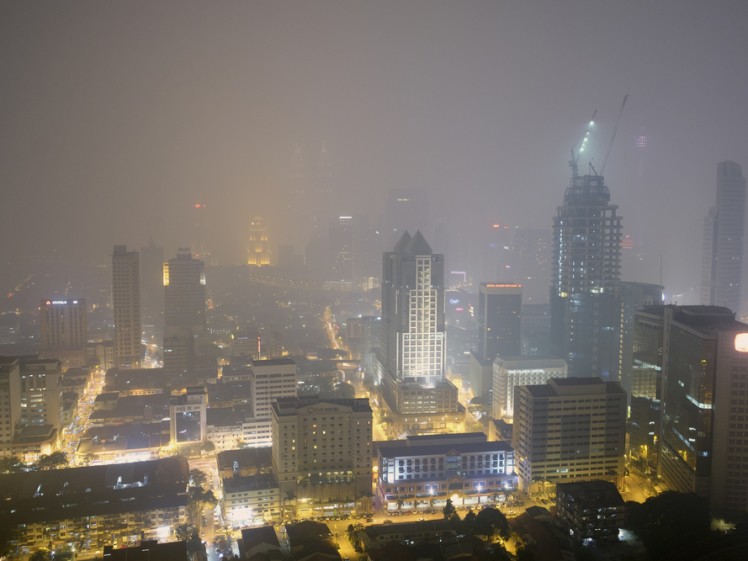
The Expat Group’s editor Chad Merchant shares his thoughts on the latest haze problem that has plagued the peninsula
For weeks on end recently, Malaysia, Singapore, and Indonesia coughed and choked under a blanket of smoky haze. The pollution isn’t just visually unappealing, but also has serious consequences for human health – as well as that of the flora and fauna of the region – and exacts a frightful toll on the economies of these nations, too.
Though the fires that have raged in Sumatra and Kalimantan in late 2015 are among the worst in history, the unfortunate reality is that this is nothing new. For nearly 30 years, a cycle of slash and burn agricultural clearing and planting has contributed mightily to the annual haze problem in the region.
A recent article in TIME magazine laments that absent a “massive transformation of agricultural sector, Southeast Asia must get used to pollution and resource destruction on this scale – something the world has never seen – on an annual basis.” But in the first half of November, the air over Peninsular Malaysia began to clear. And as the haze faded from the environment, it seemed to fade from memory just as quickly.
But it’s certain to return. And with each recurrence of the haze, huge populations are affected, some 40 million in Indonesia alone. Millions more in Singapore and Malaysia also suffer, but it’s really not much of a fair comparison at all: While the worst API readings in Malaysia last month seldom cracked the 300 “hazardous” mark (though often fl irting with it), the readings in Sumatra routinely soared over 500 and stayed there. Readings at sites in central Kalimantan were far worse, spiking at unfathomable numbers over 2,000.
Here in Malaysia, schools were closed for days, sidelining over two million children. Competitions and sporting matches have been scratched, too, including a marathon which had over 30,000 runners registered.
Environmentally, the fires and resultant blankets of haze wreak a devastating toll. In the latest round of burning, experts say Indonesia released more polluting emissions in three weeks than Germany had all year, and even eclipsed the daily emissions of the significantly more developed United States. The cumulative loss to habitat and biodiversity is incalculable, as well as to the health and well-being of the countless animals in the region who don’t have the option of retreating into the air-conditioned indoors.
The TIME article calls the annual fires and haze a “colossal failure of governance,” some stemming from corruption and some from a lack of resources. It also roundly criticises ASEAN for its lack of action, and correctly states that the blame cannot be assigned exclusively to Indonesia, as a number of Singapore- and Malaysia-based plantation companies and commodities traders are just as much to blame for the deforestation and haze.
For any meaningful solution to occur – and given the sheer length of time the haze has been a problem here, I’m not optimistic it will be solved immediately – there must be a regional assessment of not just the superficial cause of the fires, but the deeper issues in the agricultural industry.
Some have suggested limiting the land area for the palm oil sector to the several million hectares already deforested and used for oil palm plantations, rather than allowing continued unchecked expansion using the current model of indiscriminate burning and clearing. Of course, this brings economics and sovereignty issues into the equation, and ensures that a solution will not be easy to reach, much less enforce.
Solving the perennial haze problem is an issue also compounded by our own short attention spans. When things are bad and the city is plagued with seemingly endless days of eye-watering pollution, everyone talks about it. Everyone demands action.
But then, the winds shift, the haze clears, and the urgency is lost. The problem is all but forgotten… until it pays another visit, which it never fails to do. This morning, the API was a pleasantly low 21. The sun was shining, the skies were blue. A week of this kind of environment could easily have us forgetting what it was like when that number was well over 200, and that is the problem. Once the haze is blown away, we move on, and it’s if it never happened at all – until it comes back. All is forgiven for the moment, but the moment never lasts.
We have heard from expats who express all the same complaints about the haze as locals, with perhaps the one key difference being that these expats can leave Malaysia. Some have mentioned that quite pointedly, saying they don’t want to raise their kids in a place so polluted, or consistently be forced to rely on air filters and masks, or curtail their outdoor activities for half the year. For me, I also dislike looking at the grim white sky day after day.
Blue skies and plentiful sunshine may push the temperature up, but it also does wonders for my emotional well-being. Weeks of dispiriting white skies and a fog of ugly haze obscuring everything definitely drags me down. So I was delighted this morning to step onto my balcony and see some blue skies and take in some crisp, reasonably clean air.
But as quickly as the haze can disappear, it can rebound. The 21 reading from this morning is now 84, just eight hours later.That’s not too bad, but who knows what tomorrow will bring? One thing is certain, however: without real action from the governments of the countries involved – including not just stronger enforcement but the active provision of solutions and alternatives – the annual haze over the region will continue, and the boundless environmental plundering will be a dire legacy left to the children of ASEAN.
This article was originally published in the January 2016 issue of The Expat magazine. It is available for free with a digital or print subscription.
"ExpatGo welcomes and encourages comments, input, and divergent opinions. However, we kindly request that you use suitable language in your comments, and refrain from any sort of personal attack, hate speech, or disparaging rhetoric. Comments not in line with this are subject to removal from the site. "





















FYI…This story/review is outdated, the haze is gone …
But the effects will last for months, don’t you think Julia?
Again?
Dawud Not again, we’re just discussing the effect of the last episodes of the haze 🙂
How long will be like that